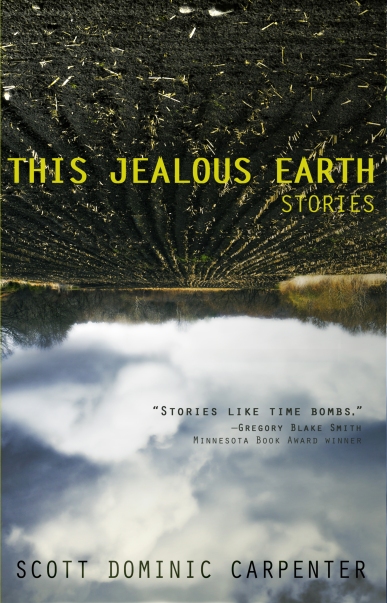‘This Jealous Earth’ by Scott Dominic Carpenter
-Reviewed by Ian Chung–
This Jealous Earth is Scott Dominic Carpenter’s first collection of short stories, and it is also the first title to launch for MG Press, the publishing arm of Midwestern Gothic. Both literary journal and micro-press share the same core values of ‘shining a spotlight on Midwest authors by focusing on works that showcase all aspects of life—good, bad, or ugly’. Carpenter’s collection also stays true to this in the variety of characters that it showcases, all of whom are united by what he refers to as ‘the question of choice: in each story characters arrive at a fork in the road, and they need to choose a path that will alter their future in important ways’.
The book opens with ‘The Tender Knife’, a story underpinned by the tension between youth and age, pragmatism and sentimentality. At his young wife’s insistence, Walter is steeling himself to cull the population of his koi pond. What should be an ordinary affair becomes complicated by his guilt at having to kill a bunch of fish ‘built to outlive him’: ‘What bothered him more than the killing was the parting, the leave-taking. Harder to sever than flesh were all those other filaments, the invisible ties that bound him like live nerves to those he loved.’ When Walter’s decision at the end of the story is to once again avoid the problem, having gone through one traumatic almost-botched koi beheading, it is hard not to sympathise with his wish to just be with his grandchildren, ‘escaping, however briefly, from this warm land with its bubbling ponds and its lies of eternal summer’.
As for title story ‘This Jealous Earth’, it serves up an interesting variation on the usual ‘end times’ narrative by presenting events from the perspective of Catherine, a young girl who refuses to let her blaspheming, unbelieving older brother be left behind, even at the cost of her place among the supposed elect. Midway through the story, there is a moment where Catherine keeps stuffing more and more items into her dress pocket, thinking to herself, ‘Her pocket felt heavy now. It weighed her down. This jealous earth didn’t want to let her go.’ Rather than taking the easy option of turning his story into a straightforward critique of the Driscoll family’s cultic beliefs, Carpenter instead uses the ending to demonstrate that in extremis, the bond of family may prove to be the strongest force of all, and it is really we who do not want to let each other go.
Alongside these short stories, Carpenter’s collection also mixes in a couple of flash fictions. Pieces like ‘Foundering’ and ‘The Phrasebook’ succinctly portray relationships in various states of crisis. The former contains this heartbreaking evocation of empty nest syndrome: ‘Even the children, it turned out, were only on long-term loan, and the departure of each cardboard box felt like another melon ball scooped ever closer to the rind.’ The latter matter-of-factly relates: ‘Something went wrong. The turns were too sharp. We were going too fast. We thought it was all under control. By the time we understood, it was too late. The collision was too violent. The damage had been done. Only the formalities remained, the paperwork.’ After this paragraph of relatively short sentences, the final ‘Please, I need to report an accident’ forms a sobering coda to the whole flash fiction.
It is a testament to the consistency of Carpenter’s narrative skill that I could have picked any story in This Jealous Earth and found something about it to recommend in this review. As it is, there is not enough space to say much about the surreally funny ‘Sincerely Yours’, beyond that as a one-time student dealing with utility bills, I completely empathise with the protagonist’s predicament. Or ‘The Death Button’, which despite its title, turns out to be a rather morbidly sweet love story. Or ‘General Relativity’, a story made all the more effective by its refusal to explain its fantastical element, in which the narrator experiences whatever he reads. So This Jealous Earth is packed full of surprising tales, and best of all, if like me, you read it and really enjoy Carpenter’s writing, you can look forward to his debut novel, Theory of Remainders, coming out later this year from Winter Goose Publishing.
[You can read Ian’s full interview with Scott Dominic Carpenter here]



Pingback: Midwestern Gothic – A Literary Journal » Blog Archive » This Jealous Earth: Stories by Scott Dominic Carpenter
Pingback: Midwestern Gothic – A Literary Journal » Blog Archive » This Jealous Earth reviewed at Sabotage
Pingback: Interview with Robert James Russell (Sea of Trees) | Sabotage
Pingback: Midwestern Gothic – A Literary Journal » Blog Archive » This Jealous Earth: Stories by Scott Dominic Carpenter